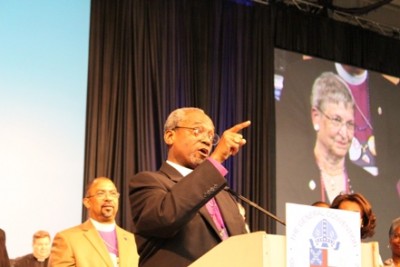 Bishop Michael Bruce Curry of the Diocese of North Carolina has been elected and confirmed as the next presiding bishop of the Episcopal Church. Curry, who will be the first African American to lead the church, was elected on the first ballot with 121 of 174 votes.
Bishop Michael Bruce Curry of the Diocese of North Carolina has been elected and confirmed as the next presiding bishop of the Episcopal Church. Curry, who will be the first African American to lead the church, was elected on the first ballot with 121 of 174 votes.
The news was announced to more than 850 members of the church’s House of Deputies and perhaps 200 observes shortly before 2 p. m. The election was greeted with sustained applause and song.
When Curry entered the hall later in the afternoon, deputies greeted him and Presiding Bishop Katharine Jefferts Schori by singing “We are one together, yo, yo, yo,” a song composed by the Rev. Lester Mackenzie, a South African native who is chaplain to House of Deputies.
The house had delayed its afternoon recess and Curry’s first words were: “Oh God love you, I know you haven’t had lunch, so no sermons now.”
The presiding-bishop elect, who will assume his duties on November 1, spoke of his love for the church. “This is the church where I learned about Jesus,” he said. “My grandmother used to say, ‘We have a good God,” and we do.
“We’ve got a society with challenges around us. … But nothing can stop the movement of God’s love in the world.”
Curry, 62, will become the first African American bishop to lead the church. He has served churches in Winston-Salem, North Carolina and Lincoln Heights, Ohio, and was rector of St. James Church in Baltimore when he was elected bishop in 2000.
Curry is known as a dynamic preacher. At the church’s General Convention in 2012 he delivered a stirring sermon urging Episcopalians to become Crazy Christians. The sermon spawned a book of the same title in which Curry wrote: “We need some Christians who are as crazy as the Lord. Crazy enough to love like Jesus, to give like Jesus, to forgive like Jesus, to do justice, love mercy, walk humbly with God— like Jesus. Crazy enough to dare to change the world from the nightmare it often is into something close to the dream that God dreams for it. And for those who would follow him, those who would be his disciples, those who would live as and be the people of the Way? It might come as a shock, but they are called to craziness.”
In 2013, Curry supported the Moral Monday movement in his state, which included numerous Episcopal clergy. He told Sharon Sheridan of Episcopal News Service: “There was a legislative agenda that was being enacted in the General Assembly that was disproportionately impacting the poor, the elderly, the vulnerable, and potentially disenfranchising even some voters. So what could have been seen as simply politics as usual became much more a matter of public morality.”
Curry allows his clergy to bless same-sex relationships. In October 2014 he released “Pastoral Policies and Guidelines for the Solemnization and Blessing of the Marriage of Same-Sex Couples.” In a preface to the guidelines he wrote: “deep wrestling with the Holy Scriptures … led me, over time, to the conviction that the lives of faithful disciples of Jesus who are gay, lesbian, bisexual and transgendered bear witness to the love of God that has been revealed in Jesus, and they can be models of holiness and sanctity of life and relationships. This led me to affirm that the Church can and should bless the unions of Christian same-sex couples as well as expand the discernment processes leading to ordination to include gay and lesbian persons who may be in covenanted, lifelong unions.”
Curry has also urged his state’s legislature not to weaken the state’s gun safety laws in an op-ed article co-written with Bishop Anne Hodges Copple for the Charlotte Observer. “Too much of the daily work of leaders of all faiths and denominations across North Carolina is helping grieving parishioners cope with loss in the wake of gun violence, and too much of our daily work is presiding over funerals of young people shot to death with guns that made their way into the wrong hands,” they wrote.
Curry, who had surgery for colon cancer in November, was born in Chicago attended public schools in Buffalo, New York, and graduated with high honors from Hobart College in Geneva, New York, in 1975. He received his Master of Divinity degree in 1978 from Yale University Divinity School.
Curry and his wife, Sharon, have two adult daughters, Rachel and Elizabeth.
[Updated at 2:10pm, MDT]